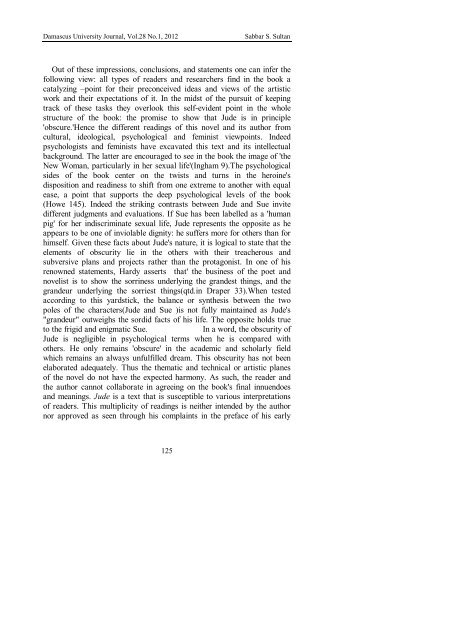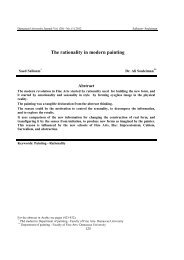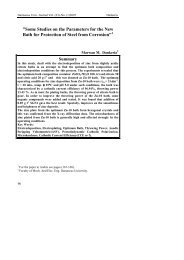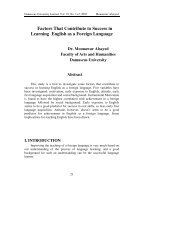Types of Obscurity in Thomas Hardy's Jude the Obscure and ...
Types of Obscurity in Thomas Hardy's Jude the Obscure and ...
Types of Obscurity in Thomas Hardy's Jude the Obscure and ...
Create successful ePaper yourself
Turn your PDF publications into a flip-book with our unique Google optimized e-Paper software.
Damascus University Journal, Vol.28 No.1, 2012Sabbar S. SultanOut <strong>of</strong> <strong>the</strong>se impressions, conclusions, <strong>and</strong> statements one can <strong>in</strong>fer <strong>the</strong>follow<strong>in</strong>g view: all types <strong>of</strong> readers <strong>and</strong> researchers f<strong>in</strong>d <strong>in</strong> <strong>the</strong> book acatalyz<strong>in</strong>g –po<strong>in</strong>t for <strong>the</strong>ir preconceived ideas <strong>and</strong> views <strong>of</strong> <strong>the</strong> artisticwork <strong>and</strong> <strong>the</strong>ir expectations <strong>of</strong> it. In <strong>the</strong> midst <strong>of</strong> <strong>the</strong> pursuit <strong>of</strong> keep<strong>in</strong>gtrack <strong>of</strong> <strong>the</strong>se tasks <strong>the</strong>y overlook this self-evident po<strong>in</strong>t <strong>in</strong> <strong>the</strong> wholestructure <strong>of</strong> <strong>the</strong> book: <strong>the</strong> promise to show that <strong>Jude</strong> is <strong>in</strong> pr<strong>in</strong>ciple'obscure.'Hence <strong>the</strong> different read<strong>in</strong>gs <strong>of</strong> this novel <strong>and</strong> its author fromcultural, ideological, psychological <strong>and</strong> fem<strong>in</strong>ist viewpo<strong>in</strong>ts. Indeedpsychologists <strong>and</strong> fem<strong>in</strong>ists have excavated this text <strong>and</strong> its <strong>in</strong>tellectualbackground. The latter are encouraged to see <strong>in</strong> <strong>the</strong> book <strong>the</strong> image <strong>of</strong> '<strong>the</strong>New Woman, particularly <strong>in</strong> her sexual life'(Ingham 9).The psychologicalsides <strong>of</strong> <strong>the</strong> book center on <strong>the</strong> twists <strong>and</strong> turns <strong>in</strong> <strong>the</strong> hero<strong>in</strong>e'sdisposition <strong>and</strong> read<strong>in</strong>ess to shift from one extreme to ano<strong>the</strong>r with equalease, a po<strong>in</strong>t that supports <strong>the</strong> deep psychological levels <strong>of</strong> <strong>the</strong> book(Howe 145). Indeed <strong>the</strong> strik<strong>in</strong>g contrasts between <strong>Jude</strong> <strong>and</strong> Sue <strong>in</strong>vitedifferent judgments <strong>and</strong> evaluations. If Sue has been labelled as a 'humanpig' for her <strong>in</strong>discrim<strong>in</strong>ate sexual life, <strong>Jude</strong> represents <strong>the</strong> opposite as heappears to be one <strong>of</strong> <strong>in</strong>violable dignity: he suffers more for o<strong>the</strong>rs than forhimself. Given <strong>the</strong>se facts about <strong>Jude</strong>'s nature, it is logical to state that <strong>the</strong>elements <strong>of</strong> obscurity lie <strong>in</strong> <strong>the</strong> o<strong>the</strong>rs with <strong>the</strong>ir treacherous <strong>and</strong>subversive plans <strong>and</strong> projects ra<strong>the</strong>r than <strong>the</strong> protagonist. In one <strong>of</strong> hisrenowned statements, Hardy asserts that' <strong>the</strong> bus<strong>in</strong>ess <strong>of</strong> <strong>the</strong> poet <strong>and</strong>novelist is to show <strong>the</strong> sorr<strong>in</strong>ess underly<strong>in</strong>g <strong>the</strong> gr<strong>and</strong>est th<strong>in</strong>gs, <strong>and</strong> <strong>the</strong>gr<strong>and</strong>eur underly<strong>in</strong>g <strong>the</strong> sorriest th<strong>in</strong>gs(qtd.<strong>in</strong> Draper 33).When testedaccord<strong>in</strong>g to this yardstick, <strong>the</strong> balance or syn<strong>the</strong>sis between <strong>the</strong> twopoles <strong>of</strong> <strong>the</strong> characters(<strong>Jude</strong> <strong>and</strong> Sue )is not fully ma<strong>in</strong>ta<strong>in</strong>ed as <strong>Jude</strong>'s"gr<strong>and</strong>eur" outweighs <strong>the</strong> sordid facts <strong>of</strong> his life. The opposite holds trueto <strong>the</strong> frigid <strong>and</strong> enigmatic Sue.In a word, <strong>the</strong> obscurity <strong>of</strong><strong>Jude</strong> is negligible <strong>in</strong> psychological terms when he is compared witho<strong>the</strong>rs. He only rema<strong>in</strong>s 'obscure' <strong>in</strong> <strong>the</strong> academic <strong>and</strong> scholarly fieldwhich rema<strong>in</strong>s an always unfulfilled dream. This obscurity has not beenelaborated adequately. Thus <strong>the</strong> <strong>the</strong>matic <strong>and</strong> technical or artistic planes<strong>of</strong> <strong>the</strong> novel do not have <strong>the</strong> expected harmony. As such, <strong>the</strong> reader <strong>and</strong><strong>the</strong> author cannot collaborate <strong>in</strong> agree<strong>in</strong>g on <strong>the</strong> book's f<strong>in</strong>al <strong>in</strong>nuendoes<strong>and</strong> mean<strong>in</strong>gs. <strong>Jude</strong> is a text that is susceptible to various <strong>in</strong>terpretations<strong>of</strong> readers. This multiplicity <strong>of</strong> read<strong>in</strong>gs is nei<strong>the</strong>r <strong>in</strong>tended by <strong>the</strong> authornor approved as seen through his compla<strong>in</strong>ts <strong>in</strong> <strong>the</strong> preface <strong>of</strong> his early125
















